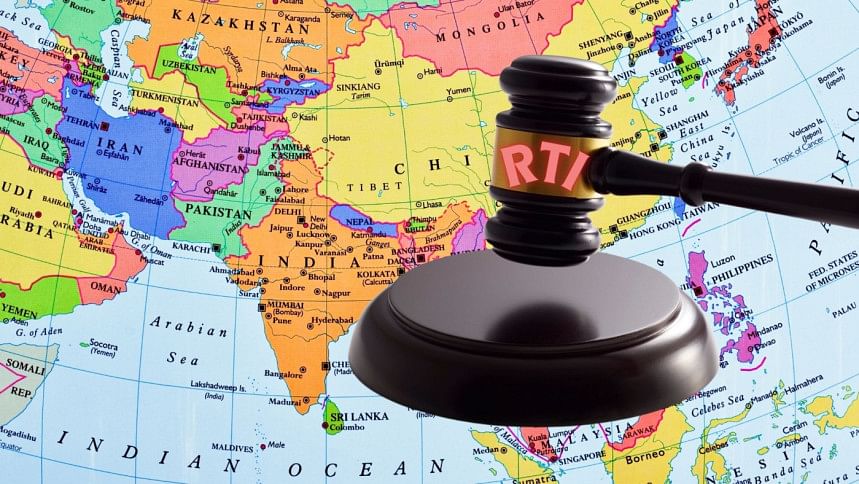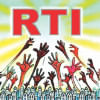How do our neighbours use the RTI law?

Since the interim government took office following the July-August uprising in 2024, this column has mainly aimed to draw the attention of our youth to the enormous potential of the Right to Information Act (RTI), 2009 as an instrument to realise their dream of just and equitable governance. However, with the departure of the three information commissioners, the Information Commission of Bangladesh (ICB) virtually became a defunct body. While we await the revival of the commission, we can learn how our neighbours in the region benefit from the law.
A perennial concern of RTI users worldwide is the definition of "public authority." Public institutions like to avoid being included in this definition so they can refuse to respond to RTI requests. Even the Indian Supreme Court once argued that it fell outside the Indian Right to Information Act, 2005, but had to change its stance due to relentless RTI activism. Our Supreme Court, too, appears to consider itself to be outside the scope of the law as it has not named a designated officer as mandated by our RTI Act 16 years after its adoption.
Last month, the Court of Appeal of Sri Lanka ruled that the Institute of Chartered Accountants of Sri Lanka (ICASL) fell within the country's Right to Information Act, 2016. This meant that professional bodies performing public functions must respect citizens' right to access information.
The case arose when an RTI applicant sought information from ICASL about an alleged fraud and misappropriation of Rs 20.7 million. ICASL refused, arguing it was not a "public authority" under the law. The applicant complained to Sri Lanka's RTI commission, which ruled that ICASL must disclose the information requested. ICASL challenged the ruling in the Court of Appeal, which upheld the commission's position. The court opined that ICASL, a statutory body with self-regulatory functions, performs duties that directly impact public interest. The statute of the body granted it authority over the accounting profession, making it accountable under the RTI framework. The judgment emphasised that any institution performing a public function must comply with Sri Lanka's RTI law, even if independently managed. This is likely to have far-reaching consequences for professional bodies and regulatory institutions in Sri Lanka. The same should apply in Bangladesh if our citizens take an interest in probing the law.
Our next story highlights the demand for complete transparency in government decisions regarding internet shutdowns, surveillance, and censorship, an issue that gained prominence during the July-August uprising. It also emphasises the importance of developing legal strategies that use court rulings to further the objectives of the RTI Act.
Internet shutdowns in India—though legally permissible—must adhere to the procedures and safeguards outlined in law and the guidelines established by the Supreme Court. For instance, under the Temporary Suspension of Telecommunication Services Rules, a review committee must be constituted if an authority imposes an internet shutdown. If this committee believes that the suspension order does not comply with the provisions of the law, it can order it to be set aside. However, the findings of review committees across the country are not publicly shared.
In this context, in May 2024, the Internet Freedom Foundation (IFF), a local civil society body, submitted an RTI request to the Home Department of the Union Territory of Jammu and Kashmir, which reportedly holds the world record for the most frequent internet suspensions. It sought information about the review committee's findings regarding internet shutdowns in the state. The response was that the information was available on the department's website. Not satisfied, IFF filed an appeal with the First Appellate Authority, which ordered disclosure of the information on suspensions since February 2024. Since IFF intends to seek disclosure of all review committee orders on internet shutdowns in the state since 2020, it decided to appeal to the State Information Commission—the Second Appellate Authority.
Media reports indicate that IFF's appeal to the Second Appellate Authority is based on Indian Supreme Court order dated February 23, 2024, in a case filed by the Foundation for Media Professionals, another civil society body, against the Government of Jammu and Kashmir. In that order, the court held that the union and state governments must publish the state's review committee orders overseeing internet shutdowns. In compliance, the central government announced in the same month that it would publish the review committee's orders assessing internet shutdowns in Jammu and Kashmir as public information without providing the reasons for such shutdowns.
The First Appellate Authority of the state had interpreted the above to apply to internet suspensions following the central government's February 2024 announcement. The IFF appeal challenges the assumption that the Supreme Court had set a temporal limitation in its ruling.
Whatever the outcome, the dogged determination of the Jammu and Kashmir civil society to pursue the matter relentlessly is admirable. Without such determination, the RTI Act cannot effectively advance public interest in a democracy. We need such determination among our citizens. We hope that the renewed energy of our youth, displayed during and after last year's uprising, will be harnessed to unlock the immense potential of the RTI Act, not least to tackle arbitrary internet suspensions.
Dr Shamsul Bari and Ruhi Naz are chairman and deputy director (RTI), respectively, of Research Initiatives, Bangladesh (RIB). They can be reached at [email protected].
Views expressed in this article are the author's own.
Follow The Daily Star Opinion on Facebook for the latest opinions, commentaries and analyses by experts and professionals. To contribute your article or letter to The Daily Star Opinion, see our guidelines for submission.

 For all latest news, follow The Daily Star's Google News channel.
For all latest news, follow The Daily Star's Google News channel. 












Comments